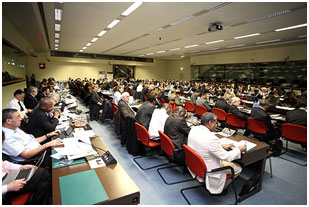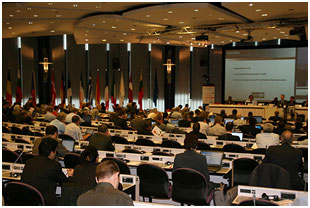

 Emerging Technologies
Emerging Technologies  News
News  1st Euro-Africa Cooperation Forum on ICT Research
1st Euro-Africa Cooperation Forum on ICT Research 1st Euro-Africa Cooperation Forum on ICT Research
- 27/03/2009![]() The 1st Euro-Africa Cooperation Forum on ICT Research was held on 25th and 26th March 2009 in Brussels. It was organised by the European Commission’s Directorate-General for the Information Society and Media, with the support of the African Union Commission and the EuroAfrica-ICT project of the EU’s 7th Framework Programme for Research and Technological Development (FP7).
The 1st Euro-Africa Cooperation Forum on ICT Research was held on 25th and 26th March 2009 in Brussels. It was organised by the European Commission’s Directorate-General for the Information Society and Media, with the support of the African Union Commission and the EuroAfrica-ICT project of the EU’s 7th Framework Programme for Research and Technological Development (FP7).
The Forum was specifically addressed at cooperation with Sub-Saharan Africa and was an opportunity for private and public stakeholders to interact, identify potential partners, find out information on the European Union – African Union Partnership on Science, ICT and Space (the 8th Partnership) and on European Commission programmes and those of the African Union Commission, and opportunities and outcomes of FP7 projects involving Africa and EU-Africa cooperation projects.
The President of Knowledge Society Agency (UMIC), Luis Magalhães, was one of the keynote speakers at the Forum in the session following the official opening ceremony. A discussion panel was organised on Africa-EU ICT cooperation with interventions focussing on the following points (see intervention lines for more details):
- Importance of international knowledge collaborative networks displaying cultural and regional diversity
- The role of e-Science (GEANT and AFRICACONNECT, immediate access to online scientific literature, open-access scientific repositories, etc.)
- Access to high performance broadband as being essential for overcoming new digital discrimination factors, together with policies facilitating and intensifying ICT use
- Importance of online organisations involving the global participation of multi-stakeholders in Internet governance, such as the ICANN, the World Summit on the Information Society and the Internet Governance Forum (IGF), and the insufficiency of traditional Weberian-structured multi-governmental organisations from the industrial age for global scale online structures
- The Information Society and the Internet are essentially people and not technology-focussed, for which reason the institutions deemed most relevant to govern it should have a humanist instead of a technocratic character.
- How can the European Union and Africa work together in the new multi-stakeholder for a, such as the ICANN and the IGF?
- The central nature of human talent and intensive interpersonal collaboration in scientific research, and the importance of providing opportunities for joint participation in research projects focussed on empowering human resources and on interaction between scientists from different countries and regions
- Knowledge as a resource for sharing and not losing instead usually increases when there is a relationship of knowledge transfer, meaning it has a special role in relationships of mutual gain, in addition to being the core resource of the knowledge-based economy
- The cross-cutting role of ICT knowledge for creating prosperity and improving people’s quality of life in all sectors (such as the transformation of education, improved energy, environment and transport systems, better health conditions and active ageing, the transformation of companies and governments and new ways of conducting cultural research)
The EU-Africa Joint Strategy and Action Plan were adopted at the EU - Africa Summit held in Lisbon on 7th – 9th December 2007. The concrete action lines and objectives for the 2008-2010 period are outlined in eight Africa-EU partnerships. The Partnership on Science, ICT and Space, named the 8th Partnership, encompasses programmes related to empowering resources, the production of knowledge and technological innovation, with ICT acting as key enablers for economic growth and poverty reduction, in the context of the World Summit on the Information Society objectives, namely with the objective of providing for an inclusive information society in Africa, and bolstering cooperation based on space technology applications.
Also in the scope of the Portuguese Presidency of the European Union and to mark the EU - Africa Summit of 7th – 9th December 2007, the Conference "Space and Development: the case of GMES and Africa" was also held in Lisbon on 6th – 7th December. The conference was jointly organised by Portugal’s Ministry of Science, Technology and Higher Education together with the European Space Agency (ESA), the European Commission and the GMES – Global Monitoring for Environment and Security.
Photos of the 1st Euro-Africa Cooperation Forum on ICT Research:


